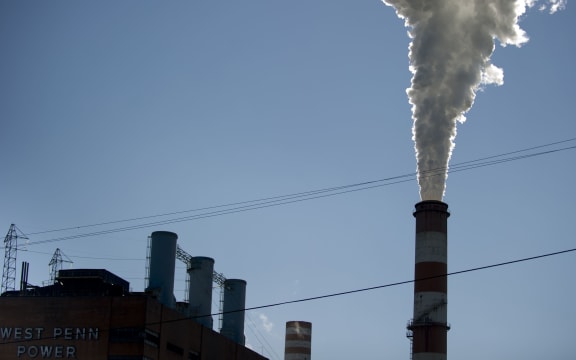Hawaii's only coal-fired power plant has burned for the last time after it closed down last week.
The last coal shipment arrived in the islands at the end of July, and the coal plant closed on Thursday after 30 years in operation.
The facility produced up to one-fifth of the electricity on Oahu.
Hawaii Governor David Ige says the facility is one of the largest emitters, and closing the facility means the end of 1.5 million metric tons of greenhouse gases being emitted annually.

The Mitchell Power Station, a coal-fired power plant near Pittsburgh. Photo: AFP
In 2020, Hawaii's Legislature passed a law banning the use of coal for energy production at the start of 2023.
Hawaii has mandated a complete transition to renewable energy by 2045, and was the first state to set such a goal.
But critics say that, although ending the state's dirtiest source of energy is ultimately a good move, doing so now is not. Renewable sources meant to replace coal energy are not yet online because of permitting delays, contract issues and pandemic-related supply-chain problems. So the state will instead burn costlier oil, which is only slightly less polluting than coal.
"If you are a believer that climate change is going to end because we shut down this coal plant, this is a great day for you," said Democratic state Senator Glenn Wakai, chair of the Committee on Economic Development, Tourism and Technology. "But if you pay an electricity bill, this is a disastrous day for you."
The end of coal and the additional cost of oil will translate to a 7 percent increase in electricity bills for consumers who already face the nation's highest energy and living costs.
"What we're doing ... is transitioning from the cheapest fossil fuel to the most expensive fossil fuel," Wakai said. "And we're going to be subjected to geopolitical issues on pricing for oil as well as access to oil."
The AES coal plant closure means that Hawaii joins 10 other states with no major coal-fired power facilities, according to data from Global Energy Monitor, a nonprofit organisation advocating for a global transition to clean energy. Rhode Island and Vermont never had any coal-fired power plants.
While Hawaii is the first state to fully implement a ban on coal, a handful of others previously passed laws. The 2015 law in Oregon, the first state to pass a ban, isn't effective until 2035. Washington state's 2020 coal ban starts in 2025. California, Maine and Texas are among states that have restricted construction of new coal-fired plants.
The number of coal-burning units in the US peaked in 2001 at about 1,100. More than half have stopped operating since then, with most switching to more cost-effective natural gas.

